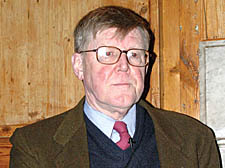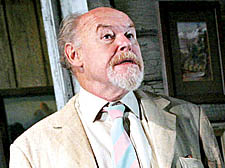|
|
 |
| |

Alan Bennett at Burgh House

Timothy West in Bennett’s play The Old Country |
The nation's favourite from the mantelpiece
Just how many more awards can
Alan Bennett win, asks Matthew Lewin
OUR modern governments can be just as treacherous as the Cambridge
spies were, Britain’s favourite playwright, Alan Bennett,
told a capacity audience at Burgh House in Hampstead last Thursday.
His comments about the spies were part of a wide-ranging
discussion which covered his early life in Yorkshire, his early
work in the theatre as well as his more recent triumphs, and
also the vexed question of why he allowed a cantankerous vagrant
to live in a van in his driveway in Gloucester Crescent, Camden
Town, for 15 years.
Mr Bennett, the multi-awardwinning author of more than 30 plays
for stage and television as well as four cinema screenplays,
and a number of acclaimed works of non-fiction, picked up his
most recent accolade at the British Book Awards just a week
before the talk, when he was declared the Readers Digest Author
of the Year for his autobiographical work about his childhood
and parents, Untold Stories.
He gave a very embarrassed grin when asked why he had been pictured
in all the papers with the very busty reality TV show contestant,
Kerry Katona. “Well, I had no idea who she was, really.
They just asked me if I wouldn’t mind being photographed
with this young lady, and I agreed. But it was alright, because
she had no idea who I was either,” Bennett said.
He spoke about his parents, describing them as being “shy
and diffident” people. “My father particularly didn’t
like people showing off of any sort, and as a child I did show
off quite a lot. I was quite clever at school (and I knew it),
and I think I was rather obnoxious at times, really. They didn’t
go out much, and they didn’t entertain much, but they were
very much in one another’s company, and very fond of one
another, which made it awful when, my father died, because my
mother was so bereft.”
Asked if he had faced criticism for “using” his parents
in his writing, he replied: “As a writer, if you can’t
write about your family and your parents, then I don’t
know what you can use. The American writer, Flannery O’Connor
said that anyone who had survived their childhood had got enough
material to last them for the rest of their lives. I think that’s
true.”
One example was his discovery that his maternal grandfather,
who he had always been told had died from a heart attack, had
in fact committed suicide in 1928. “So, having thought
that we were a very straightforward family, with no secrets
at all, I found that there was this secret right at the heart
of the family which had not been spoken about for more than
40 years. I tried to find out more about my grandfather’s
suicide and I found a long account in the local paper of the
time, the Armleigh And Workleigh News, about how he had gone
out on a tram to Rodleigh, on the outskirts of Leeds, on which
there had also been a policeman who had known him and spoken
to him. Just before the policeman got off, my grandfather shook
hands with him and said: ‘I hope you have a better life
than I have managed to have’. The policeman got off and
started thinking about what he had said, and thought that it
was so peculiar that he went and got the next tram back, and
when he got to Rodleigh he walked along the canal and found
my grandfather’s body in the water.”
His theatrical career started with the famous 1960 collaboration
with Jonathan Miller, Peter Cook and Dudley Moore called Beyond
The Fringe, which started life as a review at the Edinburgh
Festival and ultimately became a world-wide hit – with
productions travelling to America, Australia and even South
Africa. He revealed that all the cast were paid a flat rate
fee of £100 per week. Around the middle of his career,
Mr Bennett wrote three plays about what are sometimes referred
to as the “Cambridge spies”, one of which, The Old
Country, is currently in revival at the Trafalgar Studios theatre
in Whitehall, with Timothy West in the starring role.
The other two were An Englishman Abroad (his famous account
of the real-life meeting in Moscow between actress Coral Browne
and spy Guy Burgess), and A Question Of Attribution, about the
Queen’s relationship with the so-called fourth man, Sir
Anthony Blunt.
Bennett said that he didn’t condone what the spies had
done, but he didn’t accept that their kind of treachery
was the “crime of crimes”, although it has suited
various governments to portray it as such. He pointed out that
they had all acted out of deep convictions, not because of any
financial inducements, and most of them had become involved
in the 1930s when the world situation was very different.
He added: “I think that in most cases it was a situation
in which once they had taken the first step they couldn’t
go back.”
But governments could be equally treacherous, by withholding
information from people.
Bennett explained: “In 1957, for example, there was a nuclear
accident at Windscale in which the full extent of the fall-out
was hidden from the public. We don’t know how many hundreds
of people died as a result, probably many more than ever died
as a result of what the spies did, but was this cover-up any
less culpable than what the Cambridge spies did? And what about
going to war with Iraq based on all kinds of false information?
I think that‚s pretty treacherous too.”
Bennett agreed that he did not like to be described as “lovable”
or “nice”, but he was then asked how, in that case,
he had put up with the difficult woman who had lived in a van
on his property for 15 years.
“Well, the truth is, of course, that I had no idea that
it was going to be 15 years. It started when she was living
in the van in the street, and she was constantly being molested
and harassed by youths and vandals, and there was always such
a to-do in the street about it that I couldn’t get any
work done at all. So I said that she could put her van in my
driveway – temporarily. After that, it was a question of
will power – this woman had much more will-power than I
had, and she ended up staying there until she died 15 years
later.”
One of his greatest triumphs was his stage play, The Madness
Of George III, which opened at the National Theatre with Nigel
Hawthorne in the lead in 1992. Bennett also wrote the screenplay
for the later film, which was renamed: The Madness Of King George.
Asked whether this was because it was feared that American audiences
might confuse the name with a certain presidential family, Mr
Bennett explained that the real reason was that American distributors
worried that their audiences would ask: “What happened
to the first two Madness Of George films?
“I thought that was all quite silly, really, because most
Americans know George III, because he was the English king they
fought against when they won their independence from colonial
rule.”
Bennett revealed, however, that the work he is most proud of
is The History Boys, which has also been touring the country
after two sell-out runs at the National Theatre. It too has
been converted into a film, starring members of the original
cast, which will be released in a few months time.
He ended the evening with a poignant reading of a speech from
his 1980 play, Enjoy, about a series of objects on a mantelpiece,
which was received with rapturous applause. |
|
 |
|


